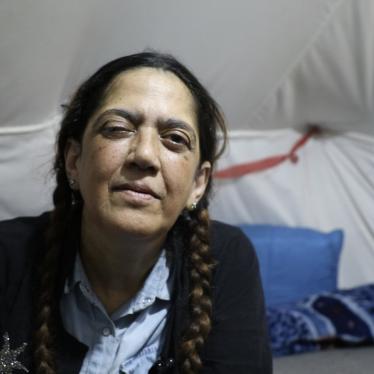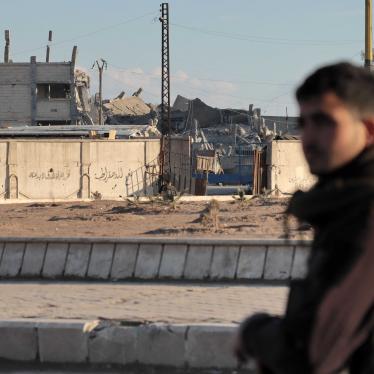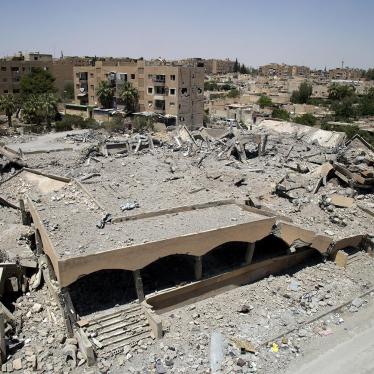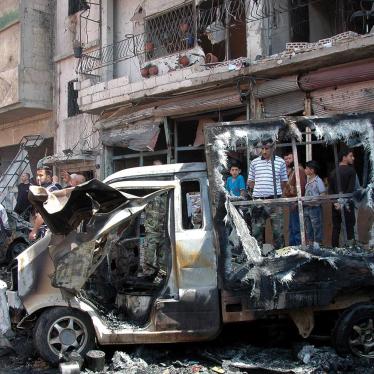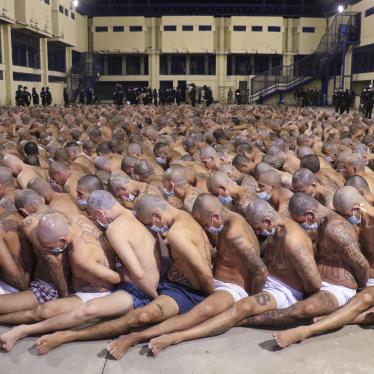(Beirut) – Kurdistan Regional Government (KRG) authorities in Kirkuk are forcing internally displaced Sunni Turkmen to leave the city, Human Rights Watch said today.
Affected residents said that the regional government’s Asayish security forces confiscated their identity and benefits cards and otherwise harassed them. They said the intention was to compel them to return to towns under the control of abusive Shia units of the Iraqi government’s Popular Mobilization Forces (Hashd al-Sha’abi or PMF). The Sunni Turkmen said they thought the abuses were linked to the perception among KRG authorities that the Turkmen come from areas where some Sunni residents supported the Islamic State (also known as ISIS).
“All Iraqis have the right to live in safety, and forcing displaced Turkmen families out of their homes to parts of the country where they would be in danger is particularly egregious,” said Lama Fakih, deputy Middle East director at Human Rights Watch. “KRG forces should cease harassing Turkmen and unlawfully forcing them to leave Kirkuk.”
In a written response to a Human Rights Watch inquiry, a KRG spokesperson denied that displaced people were being given a deadline to leave Kirkuk, a major city in Iraq’s so-called “disputed territories” between the Iraqi government and the KRG, and that any religious or ethnic groups, including Turkmen, were being discriminated against. He said, however, that based on a decision by local authorities, displaced people “whose areas have been liberated months or a year ago are assisted to return to their original areas of residence.”
Following an ISIS attack on Kirkuk on October 21, 2016, KRG authorities forced hundreds of displaced Sunni Arab families to leave the city. Human Rights Watch has not identified any cases of displaced Kurdish or Shia residents being forced to leave Kirkuk.
In February 2017, Human Rights Watch interviewed 14 Turkmen, including three women, who had been living in Kirkuk since 2014 because of insecurity elsewhere in Iraq. All had registered with local authorities as required. In some cases, Asayish officers had confiscated their essential documents then and told them to leave the city, but had not followed up until recently. In other cases, the Asayish had confiscated the documents in recent months and ordered them to leave Kirkuk. All were in hiding in Kirkuk and most had eluded attempts to force them to leave. Two of the Turkmen said Asayish tried to force them out in late 2016, two in January 2017, and eight in February. They said that they were afraid to return to their homes because PMF units that were controlling their towns would target them because they were Sunni.
People interviewed said that Asayish officers who confiscated the documents said they would be returned when the owners left the city or when they reached the Daquq checkpoint, 30 kilometers south of Kirkuk and the border of the governorate. Several Turkmen said that the Asayish arbitrarily detained them for several hours and, in some cases, beat them as part of efforts to compel them to leave the city.
Confiscating Turkmen families’ documents further marginalizes an already vulnerable group, Human Rights Watch said. These cards are two of four identification documents Iraqi citizens are regularly required to present when visiting government offices or institutions. A failure to present an ID when requested at a checkpoint can result in detention. Without both cards, individuals are not able to obtain humanitarian aid or other benefits. Without ID cards, they are unable to buy property, or vote in local or national elections.
One Turkmen man said that his son was in custody near Tikrit, “but I can’t even go visit my son in Tikrit because I have no ID card to travel.” All of those interviewed said they were struggling to provide for their families because they could not get food assistance without their cards.
International human rights and humanitarian law prohibit forced displacement because of a person’s religion or ethnicity. The United Nations Guiding Principles on Internal Displacement provide that all internally displaced people have the right to liberty of movement and freedom to choose their residence (principle 14). They also have the right to seek safety in another part of the country and to be protected against forcible return to any place where they would be at risk (principle 15). All humanitarian assistance should be provided without discrimination (principle 24).
In a written response to Human Rights Watch about its findings, Dr. Dindar Zebari, chairman of the KRG High Committee to Evaluate and Respond to International Reports, said that Kirkuk’s Asayish contend that:
There has not been such thing as a deadline for the refugees [i.e. displaced people] to leave Kirkuk, especially Sunni Turkmen as there has not been any kind of discrimination or ill-treatment against any religions or ethnicities. According to a decision by the Kirkuk governorate, governors and the Iraqi Council of Ministers, the refugees whose areas have been liberated months or a year ago are assisted to return to their original areas of residence. … For that reason, sometimes it has been necessary to take their documents for their return procedures so that the checkpoints will not prevent them from getting back their land and properties.
Dindar said that as displaced people passed through the relevant checkpoint, usually Daquq, authorities would return their documents.
KRG authorities should make a public commitment to immediately end unlawful forced displacements and return all wrongfully confiscated identity documents and benefits cards, Human Rights Watch said. The authorities should provide compensation, including housing and other assistance, to families harmed by being unlawfully forced out of Kirkuk.
“Turkmen families, like any other Iraqis, have the right to live in Kirkuk without fear of having their papers taken or being forcibly evicted,” Fakih said.
All names of those interviewed have been changed for their protection.
Fear of Returning Home
Ethnic Turkmen interviewed by Human Rights Watch said that because of their fear of returning home, they have taken the risk of continuing to live in Kirkuk after Kurdish officials confiscated their documents.
Most of those interviewed were from Yengice, an ethnically Turkmen town in Salah al-Din governorate, 62 kilometers south of Kirkuk. Yengice fell under ISIS control in June 2014, and PMF and Kurdish Peshmerga forces retook the town three months later in September 2014.
The displaced Yengice residents said that the Khorasani Brigades, a PMF unit, immediately set up a base inside the deserted town. The Turkmen have been afraid to return home because of serious abuses by PMF against Sunnis elsewhere. Human Rights Watch has documented such abuses in Fallujah and Nineveh, among others.
One man from Bustamli, a Turkmen village six kilometers south of Yengice, said fear of being targeted by PMF kept him from returning home. He said that while some Shia Turkmen families have since returned, to his knowledge Sunni families have not returned for fear of revenge attacks by PMF in the area.
Another man from the ethnically diverse Kurdish, Turkmen, and Arab town of Tuz Khurmatu in Salah al-Din, 80 kilometers south of Kirkuk, said he was afraid to return because there had been ethnic tensions, including bombings, abductions, and arson attacks by Peshmerga and PMF.
Confiscation of Documents
Some of the displaced Turkmen in Kirkuk said that Asayish officers took their papers soon after their arrival in the city in 2014 and demanded that they leave, but had not bothered them again until recently. Others had been able to keep their cards when they arrived.
“Ammar,” 30, a public health worker from Yengice, moved to the majority-Kurdish Runaki neighborhood in Kirkuk in June 2014, after ISIS took Yengice. He said that on February 19, 2017, when he was not at home, two Asayish officers arrived and confiscated his mother’s ID and benefits cards, telling her that her family had to return to Yengice since it had been retaken and that she could get her cards at the Daquq checkpoint. The family was still living at home, without the mother’s paperwork, when interviewed on February 22.
“Noura,” 45, a housewife from Yegice, said she moved to Kirkuk in July 2014. In late January 2017, she said, Asayish officers came to her home and demanded that her husband, who was out at the time, go to the Asayish office in the Raheem Awa neighborhood the next day. She and her husband and four other couples in their area who had been called in all went to the office the next day. The officers confiscated her husband’s ID card and the cards of the four other men, saying they could retrieve them from the office on their way out of the city. On February 20, Asayish officers returned to their home and demanded again that they leave, forcing the family to hide in another area of Kirkuk.
“Qassim,” 37, a laborer from Yengice, moved to the Shaterlaw neighborhood of Kirkuk in mid-2014. In late November 2016, two Asayish officers came to his home and confiscated his ID and benefits card, saying he would get them back if he left the city. After three days, Qassim said, he went to the Asayish office in the central market to try to get his documents back but officers said that they had “lost” the papers. The two officers returned to his home on February 22 and threatened to detain him if he did not leave. He and his family were still living at home when interviewed.
“Omar,” 50, a farmer, said he left his home in Yengice in August 2014, and resettled in Kirkuk’s Quria neighborhood with his family and his five brothers’ families. In early January 2015, two Asayish officers who said they were from Raheem Awa came to their house and demanded the ID and benefits cards of the entire family, saying the family had to return to Yengice and could get their papers at the Daquq checkpoint. A month later, he and his brothers, whose documents had also been taken, went to the Asayish office in Raheem Awa to demand the return of their documents.
Omar said that an officer there asked if they were prepared to leave the city but refused to explain why he was making that demand and in a loud voice ordered them to leave the office. Omar said they returned 10 days later, and the officers claimed they could not find the cards. Omar and his brothers then traveled to the Daquq checkpoint to ask for their papers, and said that an Asayish officer there said that their papers had been burned.
On February 12, 2017, Omar returned to the Raheem Awa office again to try to get his cards but the senior officer in charge told him that he and his family needed to leave Kirkuk by February 15. After Omar pleaded, the officer said he could stay until February 25, after which the officer said his forces would forcibly move them to the Daquq checkpoint. The officer made him sign a paper written in Kurdish, Omar said, without knowing what was written on it. He and his family have since been hiding in another Kirkuk neighborhood.
Arbitrary Detention and Ill-Treatment as Harassment
Several displaced Turkmen said that in early 2017, Asayish officers in Kirkuk had briefly detained and mistreated them as part of efforts to compel them and their families to leave Kirkuk.
“Zaki,” 55, a laborer from Yengice, said that in September 2015, an Asayish officer came to his home and demanded that he turn over his ID and benefits cards. The officer said he would be able to get the documents back at Daquq checkpoint. On February 21, 2017, while Zaki was selling chewing gum in the main market, two Asayish officers, one in uniform and the other in civilian clothes, detained him and took him to the Asayish office in Raheem Awa, he said.
The officers held him in a bathroom for five hours. One officer punched him for no apparent reason. Another slapped him in the face at least 10 times, saying that he had to leave town by noon the next day. An hour after he was taken into the bathroom, officers brought in his cousin, who said three officers had arrested him at his workplace. Zaki and his cousin said the officers only agreed to release them after they each signed a paper written in Kurdish whose contents they did not understand. An officer warned both, “If you do not leave the city, we will use this paper against you in court,” and with that let them leave. Zaki returned to the Asayish office the next morning, asking to speak to the senior ranking officer, but staff at the office turned him away and said that if he did not leave by noon, he would be detained. He is in hiding in Kirkuk.
“Arsan,” 52, a laborer from Yengice, said he moved to the mixed Kurdish and Turkmen neighborhood of Quria in Kirkuk in August 2014. He said that on February 12, 2017, an Asayish officer called him and told him to come to their Raheem Awa office. There he said officers demanded his ID and benefits cards, and said he had one week to leave the city and return home because his home district had been retaken from ISIS. On February 21, while Arsan was out, Asayish officers came to his home and told his wife that they would “show them hell” if the family did not leave.
Later that night, after Arsan had returned, more than 10 officers showed up, blindfolded him and took him back to the station, locking him in a small room for three hours, until a neighbor vouched for him, he said. The officers let him leave after he signed a paper whose contents he could not understand because it was in Kurdish. They ordered him to come back the next morning, telling him then to leave that afternoon. He is in hiding in Kirkuk.
Arbitrary Detention and Ill-Treatment against Alleged ISIS Affiliates
Asayish forces in the past have arbitrarily detained, and in some cases mistreated, displaced Turkmen in Kirkuk on suspicion of ISIS-affiliation. Some of those who told Human Rights Watch they had been detained for that reason had been held for several months, but all said that they were eventually released without charge.
“Muhammad,” 45, a healthcare worker, said that he and his family moved to the Quria district of Kirkuk after leaving his home in Yengice in August 2014. He said that three days a week he would drive to Tuz Khurmatu, where he worked at the local hospital. On the morning of December 29, 2014, Asayish officers at a checkpoint outside of Tuz Khurmatu detained and blindfolded him without providing a reason and held him for about 24 hours. Muhammad said that at least one guard beat his hands and legs with a plastic stick for an hour that day while questioning him about any links to ISIS.
The next day guards drove him to an Asayish office they said was in the village of Qara Hanjir, 20 kilometers west of Kirkuk, and held him for one month in a cell with approximately 60 other men, all of whom told him they were being held on suspicion of ISIS-affiliation. The guards there slapped him and punched him a few times as they accused him of delivering food to ISIS, and kept him blindfolded throughout his detention, he said. He did not have access to his family or a lawyer.
In late January 2015, guards transferred him to the Interior Ministry’s intelligence office and allowed him to telephone his family to tell them where he was. His family hired a lawyer who appeared with him before an investigative judge the next day at a Kirkuk court, he said. The judge told him that the Interior Ministry needed to complete their intelligence screening process but that he could be released within two weeks. Instead, he was held in several different facilities before Interior Ministry authorities released him on May 15, 2015, without charge, he said.
He said that two weeks after his release an Asayish officer called and told him to come into the local Asayish office with his family’s identity documents and benefits cards. The officer confiscated all of the family’s documents, and told him the family had one week to leave Kirkuk. He said they could pick up their documents at Daquq checkpoint on their way out. The officer provided no reason or paperwork for the order, Muhammad said. For nearly two years he has tried to get his documents back without success. He is unwilling to leave Kirkuk to return to his home, which he says is unsafe, and continues to live with his family in Kirkuk without any paperwork.
Because of his absence while in detention, he lost his job and had been unable to get a new one.
“Azadeen,” 63, a former soldier, said that he left Yengice in July 2014, to stay with his two brothers in the Quria neighborhood of Kirkuk. He said that in August 2014, a large group of Asayish forces and Interior Ministry forces including the local police came to their home and demanded that the three men come with them to the local police station. They held the men there for 13 days in a cell in the station, interrogating him twice, asking if he had joined ISIS. Four days into his detention, police brought Azadeen and his brothers before an investigative judge. Azadeen said he refused to respond to the judge’s questions.
He said the Asayish allowed the men’s families to visit them at the police station. He said that after 13 days, the police transferred him and his brothers to Kirkuk’s pretrial detention facility, where they were held in a cell with about 65 other detainees for 45 days. They were not interrogated or taken before a judge, and not allowed to see their families but finally were released without charge. A week later, an Interior Ministry intelligence officer came to the brothers’ home and demanded Azadeen’s identity card, and took him to the local intelligence office in Quria. The officer said that if he left the neighborhood, the officer would give him his ID back, Azadeen said.
Azadeen did not leave the city, but in the course of the next year he moved with his family to two different neighborhoods. Each time he informed the local police, Asayish, and intelligence officers. During this period the officer who had taken his ID document returned it to him.
In November 2016, Azadeen was living in a house in the mixed Kurdish, Arab, and Turkmen Faylaq neighborhood, when one day four Asayish officers came and demanded his ID and benefits cards along with those of his son, and his son’s wife. The Asayish told the family to go to the local Asayish office the next day. He said that when they arrived, an officer told him that he had orders for Azadeen and his family to return to Yengice, and that if they did, they would get their documents back at the Daquq checkpoint. He and his family have remained in Kirkuk without documentation. He said that another son was detained in October 2016 on ISIS-affiliation charges after he returned to Yengice and is being held in Tikrit. But Azadeen cannot travel to visit him without an ID card.

